Between transformation and apathy – the dynamics of the independent scene in Sofia
Published July, 2025
by Easterndaze
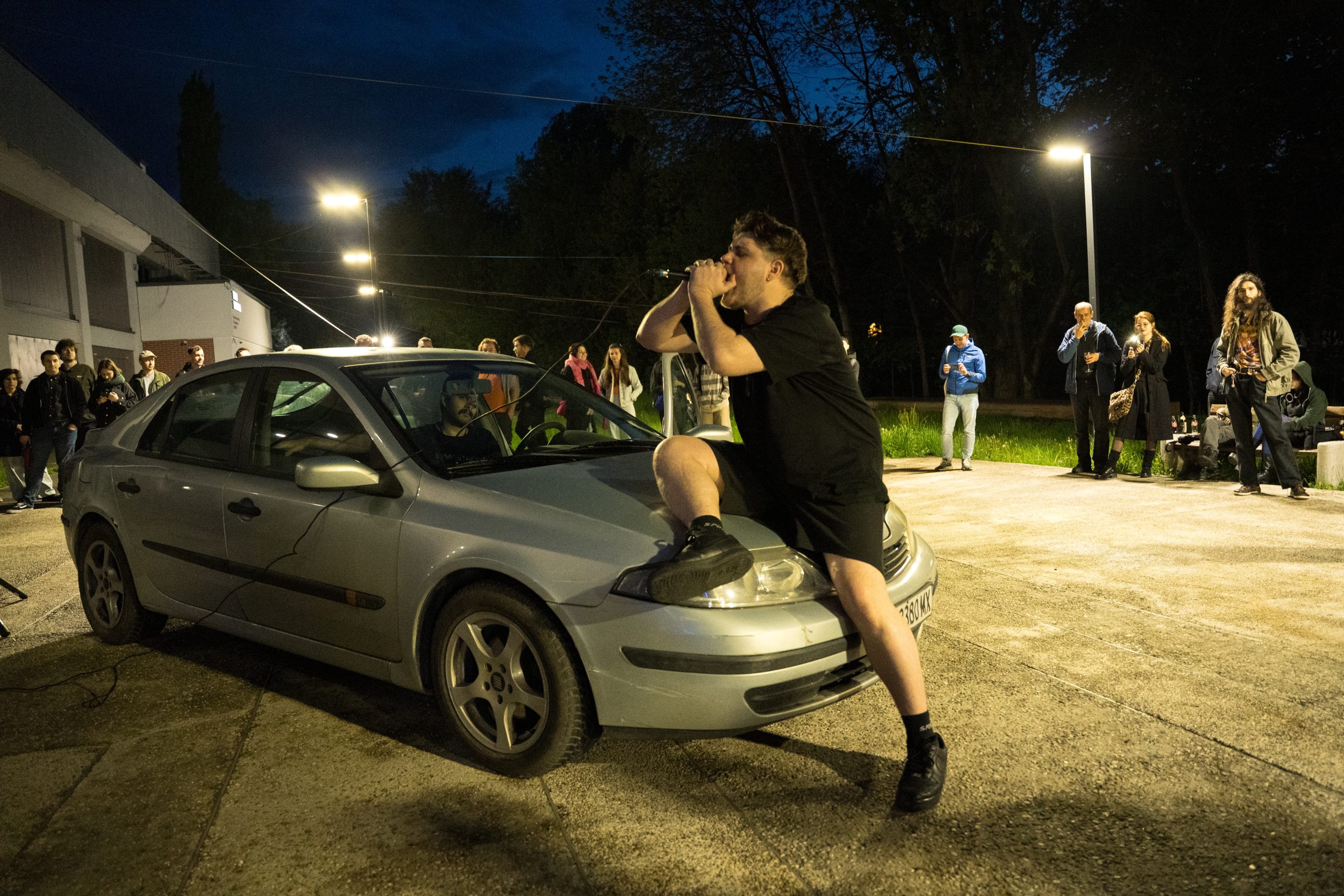
Snezhana Bezus is a DJ, a radio host, and a writer. In 2013, she compiled her first Bulgarian scene report for Easterndaze. Angel Simitchiev is a musician and a PhD in Musicology. He’s a co-founder of Amek Collective, which was part of the 2021 edition of Easterndaze x Berlin.
We’ve sat on this article for too long because it’s hard to be objective and unbiased about something we’ve spent many years of our lives trying to be an active part of, and improve. It’s even harder to admit we’re not certain what the actual state of our scene is anymore, because we feel disconnected and irrelevant. What we think we observe does not seem homogeneous enough, or it is not headed towards a state that we can understand, explain, or predict.
Like elsewhere, COVID times led many people here to realize the importance of true togetherness. The first post-pandemic year saw a drastic increase in audience interest towards pretty much any type of music, from ambient and noise to punk and techno. However, it only took another couple of years for this spark of enthusiasm to fade away. We’re now facing a brand new wave of apathy, but also transformation worth a closer look.
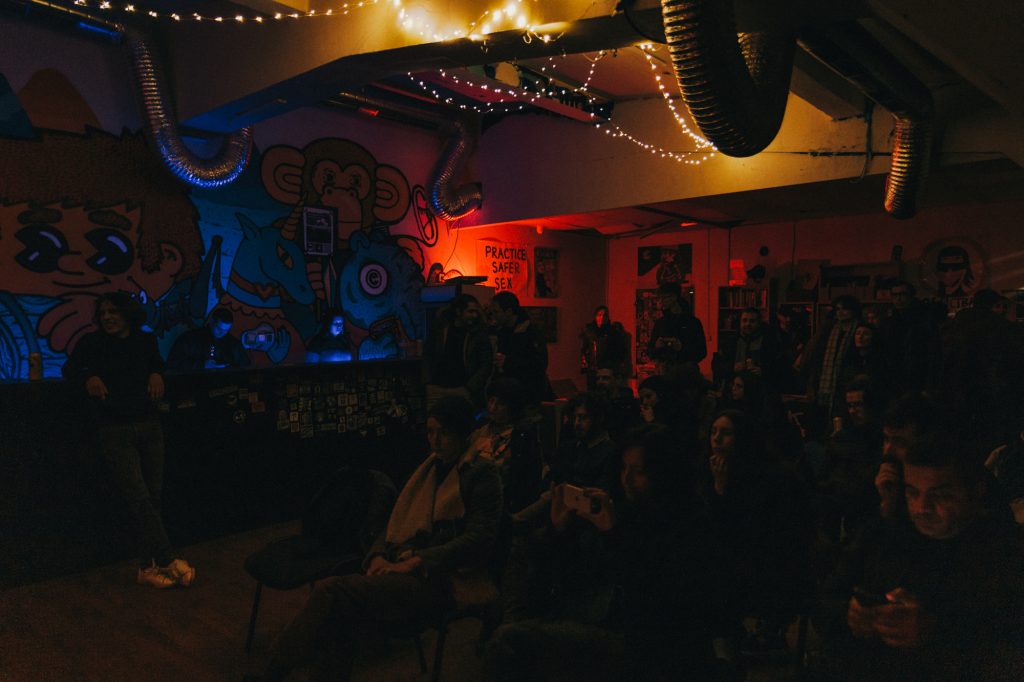
Fabrika Avtonomia, Sofia by Zlatina Tochkova
The “where”
A key factor in the existence of a scene is where events take place. Since the early 2000s, this has been an issue in Bulgaria, and Sofia is no exception. Commercial venues such as Stroeja, Mixtape 5, Maimunarnika, or Terminal 1 (currently DOM) have remained in business and are available for renting, but are way too big and demanding for many independent artists and crews. Self-run, illegal, or less profit-focused spaces like The Laboratory, Underground Gallery, Studio EW, Koncept Space, Micro, or punk hub 13eneath 12eality, which had a less hostile policy towards more fringe events, are all gone now.
Among the few still-standing bastions of DIY music and its communities are:
- Fabrika Avtonomia – currently an unpopular choice for raves but well-suited for seated experimental nights, political events, or wild punk hardcore shows.
- Bobbina – another DIY space located (literally) deep in the city that accommodates not only DJ or live events but also screenings and art happenings.
- TABA record store – a small vinyl and cassette shop that hosts regular in-store sessions with local and international artists.
- Equipaж – another DIY spot, founded by a crew of cinematographers, which also hosts live shows, raves, jam sessions, but also movie festivals, and screenings
More recently, Wrong Fest-affiliated venues like Singles Bar and the newly founded club PAVE have brought to town fresher, more “unsafe” bands and shows. In the past year or so, electronic music spots like Bunker Club or Mesmeric have also popped up. Sofia seems to be at a point where the city now has more venues on the map than ever. The question remains: where are the people?
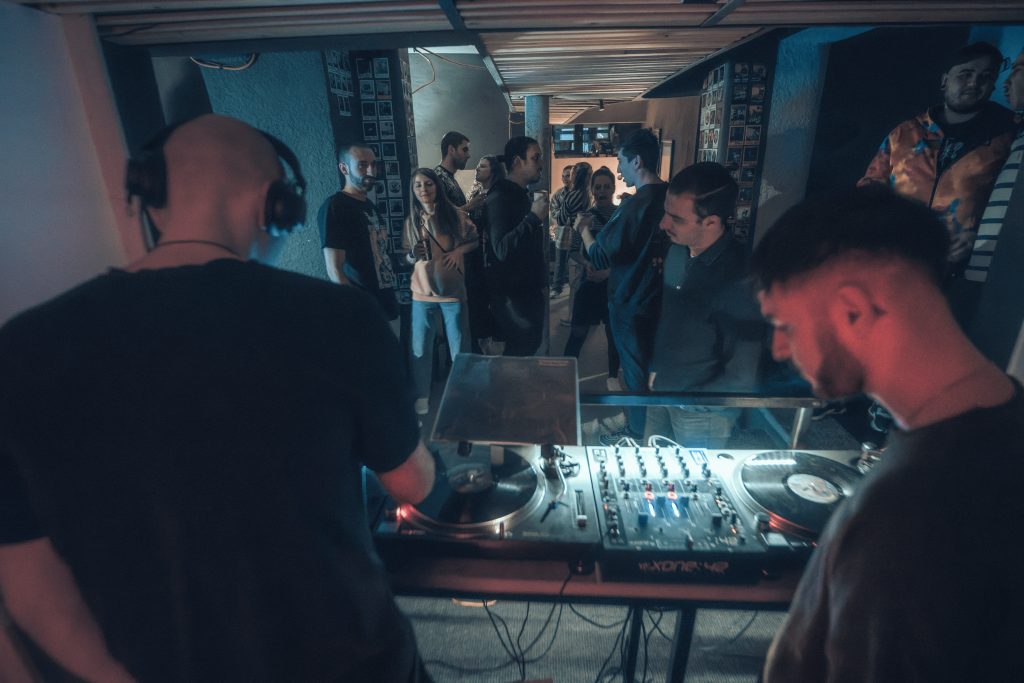
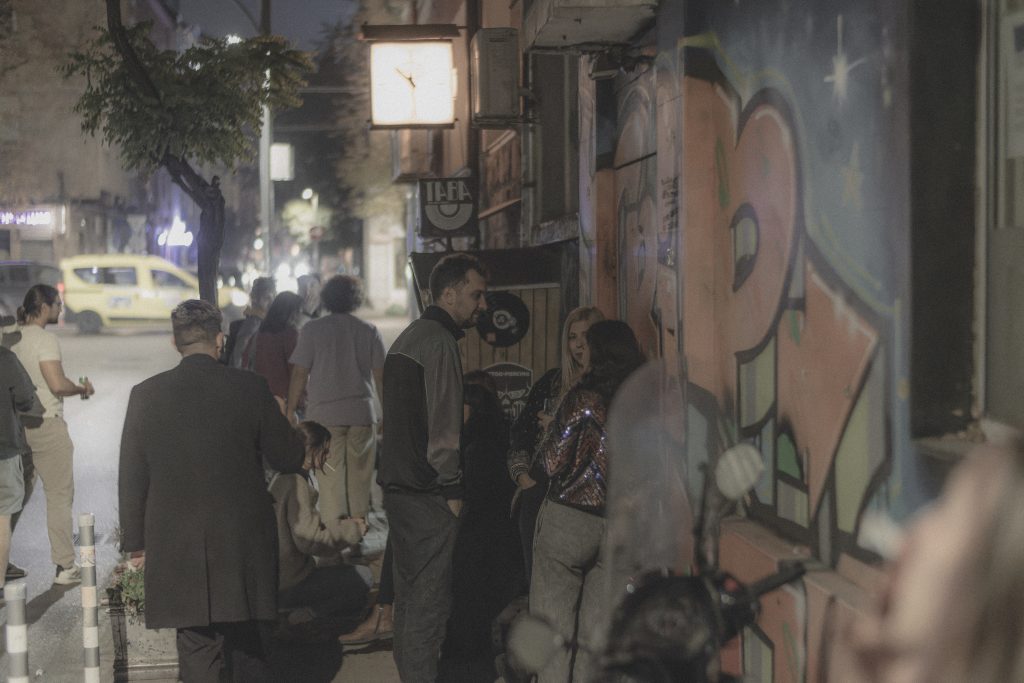
TABA Record Store by Markov
The “who”
The average attendance of a gathering dealing with ambient, drone, experimental, or leftfield electronic music is 30-50 people. This has been the reality for years (also in countries other than Bulgaria) and is usually enough for collectives not to lose so much as to go bankrupt. However, it often doesn’t justify the effort to bring an artist to perform in Sofia, including the ecological footprint of taking flights or lengthy drives. At the same time, the city is bustling with young faces, more so than ever. A pop-up chalga-crossover stunt in a small downtown city garden by the Zabranena Muzika collective is just as successful as their paid events, which attract thousands of fans across the whole country. Yet, when Croatian Amor and Aisha Davi’s AKA HEX make their debut, the vibe of the crowd is meh, even though we feel there is a fair overlap between both the target audience and the sound aesthetic.
If the people are here, what sort of problem are we dealing with? Could it be communication, as we cannot find the right way to reach each other and spark a similar level of enthusiasm for music that’s not just a cool background for having fun, but is also obscure, difficult, and still somewhere under the radar? Does social media help or make things worse with its sea of toxic opinions or the constant stream of wars and human tragedy? Whatever the answer, we’re pretty sure it’s no longer a place for authentic discovery and communication but a sad habit of counting views and likes to feel validated.
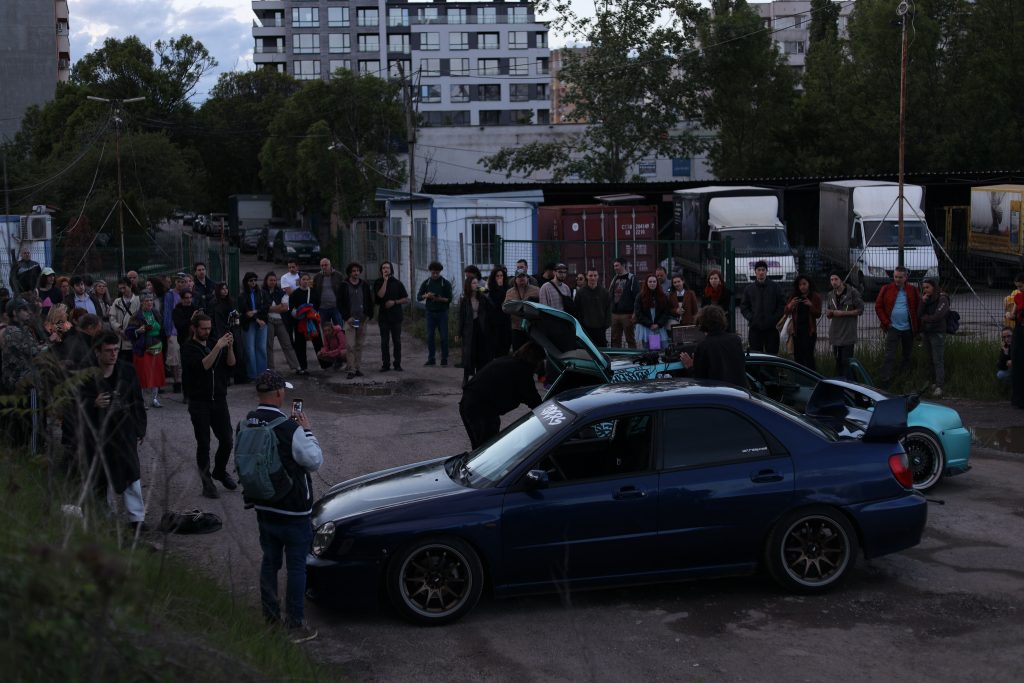
Georgi Pavlov & Yves Angelov photo by Alex Tsvetkov
Collaboration (or the lack of it)
Maybe it’s because of the forced collectiveness of Bulgaria’s former totalitarian regime, but genuine collaboration on a local and international level here is still tough. There is a strong sense of fragmentation, especially within niche, non-commercial music genres or art contexts whose communities are already limited in numbers. Information about upcoming activities or initiatives usually remains locked within small groups of people. Even though we all operate on the same grounds, we rarely reach out to each other. This is one of the weirdest features of our scene.
People do not idealistically support a particular genre of music or art form. They support their friends or acquaintances or someone of perceived importance who’s doing the work. This rule applies to crews as well. Rarely do several collectives join forces (and audiences) to make weirder and bigger nights. On the contrary, more than one small show is often booked on the same dates. While this might be seen as a thriving and competitive scene in cities like Berlin or London, in Sofia, it can be quite disruptive. Can we do a better job coordinating our efforts, or does big eat small?
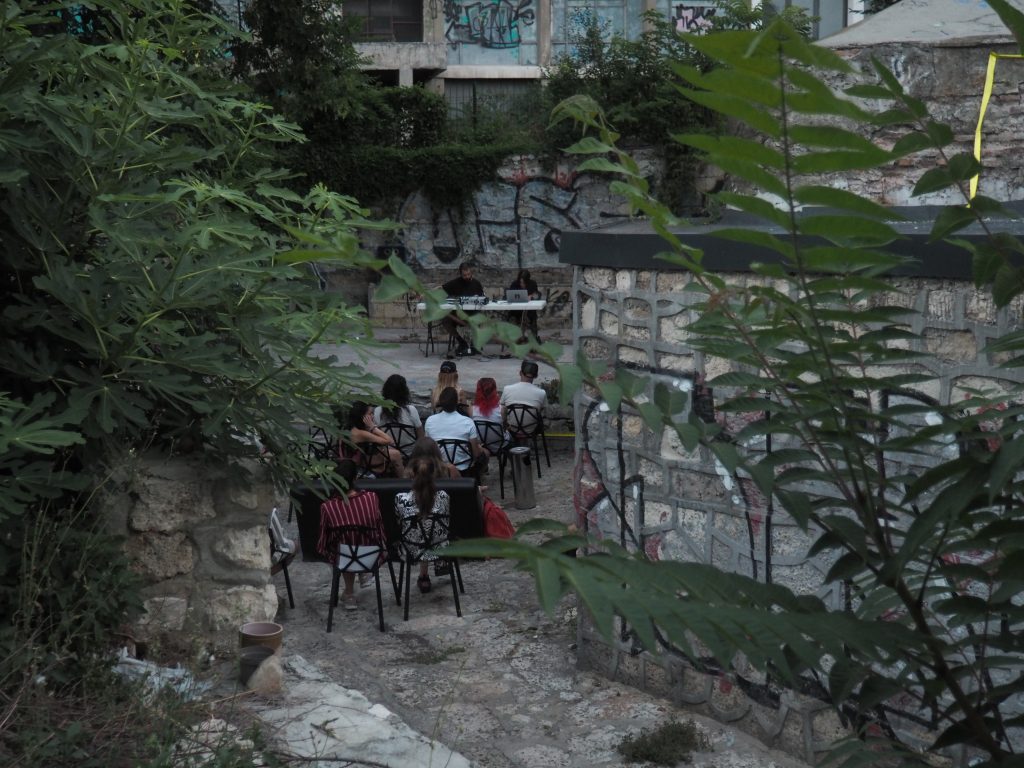
ReBonkers garden in Varna by Silvana Ilieva
Moving layers
There are still collectives that have been able to grow their supportive communities in the past years despite this general sense of lacking. One example is the increasingly active Synaesthesia Collective, who also work in collaboration with Sofia Underground Performance Festival but also do live concerts, raves, exhibitions, and performance-centered events. Earlier mentioned Fabrika Avtonomia also functions as a collective organizing events in their self-titled venue. Older crews such as Indioteque, Abandonment, Kontingent Records (or Amek for that matter) have somewhat reduced their activities. Others, such as Alarma Punk Jazz, whose relentlessness was a signature for Sofia since 2008, have recently folded operations. New entities like Sofia Synth Symposium are trying to cater to a more technologically savvy audience, while the Infinity Foundation is trying not only to curate gigs but also workshops, building a bridge between the independent experimental music scene and the more academic side of (electronic) music.
Unlike Northern Macedonia, Bulgaria has never had a strong running community radio until two years ago when OFF BEAT Radio Sofia filled this gap with an exciting weekly program and a growing community. If you’re more into Rock’n’Roll, Plovdiv’s independent X-Raydio has your back, and for a stream of strictly Bulgarian music, tune in to Darkwave Radomir Radio.
Talking about the Bulgarian scene to a large degree means observing music and events taking place in Sofia, with other big cities like Plovdiv, Varna, and Veliko Tarnovo feeling a little left out of the general discussion despite the increasing visibility of local initiatives. Some of these include Post-Kultura (Plovdiv), Varusha South, TAM, Z-Dimension (Veliko Tarnovo), ReBonkers, and esoundcorps (Varna). All those groups have dedicated significant efforts to improve the environments in their respective communities.
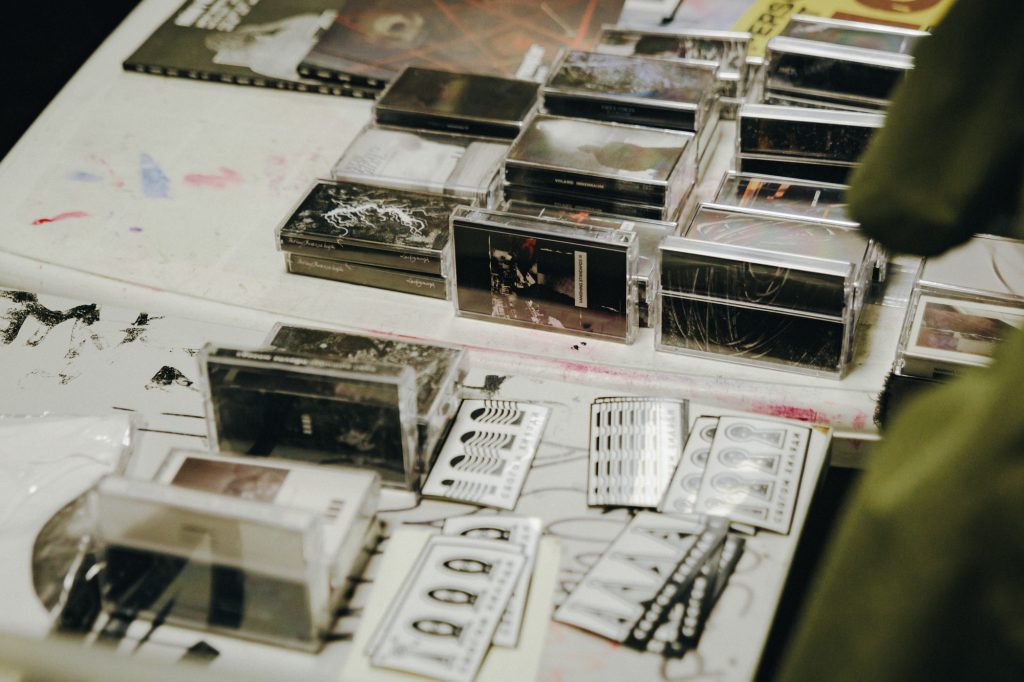
Merch goodies by Zlatina Tochkova
The music
Some of the more recent and closer looks at the Sofia local scene over at The Quietus or Bandcamp Daily have done a pretty good job dissecting what’s noteworthy, especially on the more experimental side of electronic music. It’s the usual mixture of old and emerging artists. Few acts manage to transcend the borders of our country. Alternative bands like Woomb are gaining not only local but some proper international recognition, and several side projects are already sprouting from them, namely Princess Curtain (on the more droney, shoegaze side) or Ouch Blanket. Bands like Voyvoda and TDK are still around, the latter getting noisier with every release, while the kids are spearheading their own new wave with bands like Svraka, Scarlet, Blok 13, Трън, or Тлен, to name a few. Electronic solo projects such as Niandraz, Smyah, Fashiongore (who recently collaborated with Australian noise act UBOA), Evitceles, Adonai Atrophia, or Sbogom1000 are continuously honing their craft and exploring new musical territories. Based in Tryavna, E.U.E.R.P.I. is one of the few local artists regularly touring not just Europe but wherever his music takes him. Worth mentioning are artists like Chervensky, Vezhdi (and his trio Ognebesgur, with partner in crime Bezdaren), and Kassis, who are crafting their versions of current club music.
Founded by Strahil Velchev (KiNK) and Konstantin Petrov (KEI), vinyl label Sofia Records is still regularly putting their production out there, and so is Kyustendil-based vinyl label [-M-E-L-M-A-K-], which operates within a similar sonic territory. Pleven-based Mahorka remains the hardest-working Bulgarian netlabel. In their catalog, you can find not only experimental music from all over the world but a representative selection of what’s currently happening in the country. By the time this article was being put together, Mahorka released the aptly titled Making Things Happen – a 35-track compilation of local and international collaboration tracks, which is one of their most remarkable efforts so far. We cannot overlook Stereofox, which has evolved from a music discovery platform into a label, releasing chillhop, R&B, hip-hop, jazz, and electronic music both digitally and on vinyl. Their local and international roster has gained significant traction, particularly on streaming services. In April, Stereofox got its own curator profile on Apple Music.
The future
Our scene’s major challenges – precarious venues, lack of state funding, gentrification displacing once-affordable hubs, and a wider culture that often sees experimental art as alien or elitist – will continue to exist. Yet, artists will continue to adapt, and creativity will flourish. The future of the Bulgarian independent scene most likely won’t revolve around centralized scenes or flagship festivals. Instead, it will unfold through a growing web of collaborations, DIY labels, pop-up events, and hybrid art practices. From ambient meditation to noise catharsis, from modular synthesis to choral sampling, the margins have never sounded so alive.
As Europe’s cultural capitals are saturated with hype and homogeneity, hopefully, Bulgaria’s underground offers something else: slowness, sincerity, and the thrill of the unexpected.
Text Snezhana Bezus & Angel Simitchiev
Lead photo This is really a vehicle – Georgi Pavlov & Simeon Yanakiev, photo by Niya Kirkova
This article is brought to you as part of the EM GUIDE project – an initiative dedicated to empowering independent music magazines and strengthen the underground music scene in Europe. Read more about the project at emgui.de.
Funded by the European Union. Views and opinions expressed are however those of the author(s) only and do not necessarily reflect those of the European Union or the European Education and Culture Executive Agency (EACEA). Neither the European Union nor EACEA can be held responsible for them.